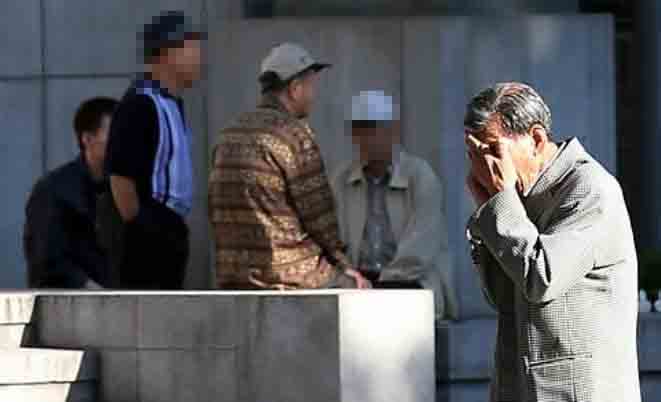- California Assembly OKs highest minimum wage in nation
- S. Korea unveils first graphic cigarette warnings
- US joins with South Korea, Japan in bid to deter North Korea
- LPGA golfer Chun In-gee finally back in action
- S. Korea won’t be top seed in final World Cup qualification round
- US men’s soccer misses 2nd straight Olympics
- US back on track in qualifying with 4-0 win over Guatemala
- High-intensity workout injuries spawn cottage industry
- CDC expands range of Zika mosquitoes into parts of Northeast
- Who knew? ‘The Walking Dead’ is helping families connect
More elderly S. Koreans committing violent crimes
Poverty, illness main reasons for growing elderly offenders

Violent crimes committed by elderly people have surged 40 percent in the last two years in South Korea. (Yonhap)
By Chung Hyun-chae
Violent crimes committed by elderly people have surged 40 percent in the last two years as the average age in society rises, according to Korean National Police Agency statistics, Sunday.
Many crimes apparently stemmed from anger over the state of their lives because of financial troubles and mistreatment, the agency said.
The number of crimes committed by people aged 65 or over increased 12.2 percent from 68,836 in 2011 to 77,260 in 2013.
The crime rate in other age groups fell or remained steady.
Even considering the soaring number of senior citizens, the number of such crimes has grown even more rapidly. While Korea’s elderly population rose by 9.6 percent from 5.7 million in 2011 to 6.2 million in 2013, according to the Ministry of Government Administration and Home Affairs, the number of crimes climbed 12.2 percent in the same period.
More worrisome is that the number of violent crimes such as homicide, robbery, rape, burglary and arson surged 39.9 percent from 759 in 2011 to 1,062 in 2013. In particular, rapes and sexual assaults rose from 608 in 2011 to 891 in 2013.
“Elderly people’s body and health conditions are much better than those in the same age group in the past, so sexual crimes committed by aged people have been increasing,” an agency officer said.
The statistics also show that in many cases old people committed crimes out of anger — most of the elderly people accused of violence said they did so “accidentally.”
These were followed by people’s dissatisfaction with their lives or families.
The officer said that poverty and illnesses may be the main reason for much of the violence.
Korea Labor Institute statistics show that in 2011 48.6 percent of Korea’s senior citizens lived in poverty, earning less than 50 percent of median household income.
The percentage was the highest among OECD members. For elderly people living alone, the rate was 74 percent.
A Ministry of Health and Welfare survey of 10,451 seniors last year showed that 89.2 percent had chronic health problems such as diabetes, high blood pressure and arthritis.
About one-third had symptoms of depression, and 10 percent had thought about committing suicide because of financial troubles, health problems and loneliness.
Seoul Metropolitan Government statistics show that 420 elderly citizens reported abuse last year, mostly by family members, including their sons.
Some officials believe that if social safety nets for the elderly were improved, it could prevent an array of crimes.
“Senior citizens are healthier than in the past, so it is important to help them to get jobs to live a stable life and enjoy leisure activities,” a city government official said.















